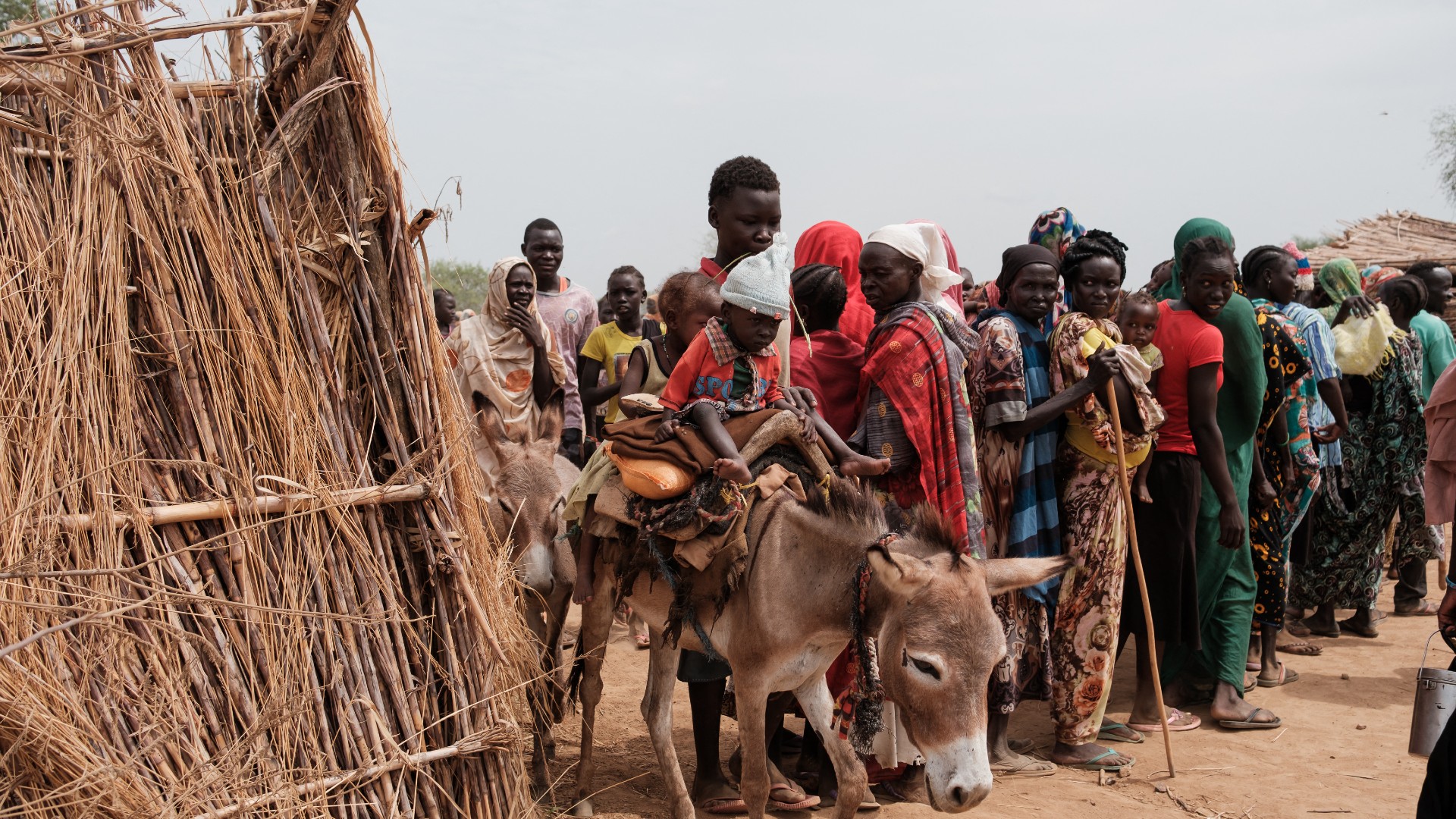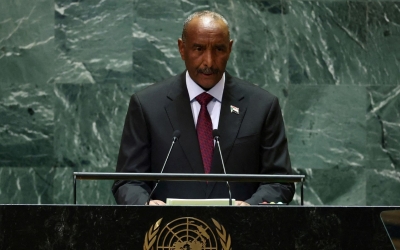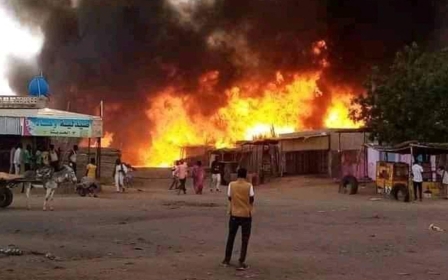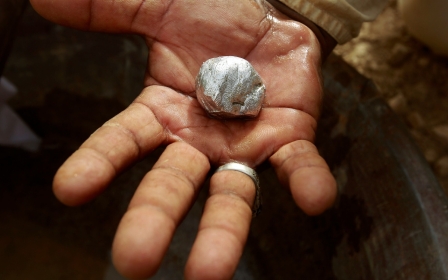Sudan paramilitary leader Hemeti accuses Egypt of attacking troops in battle for Khartoum
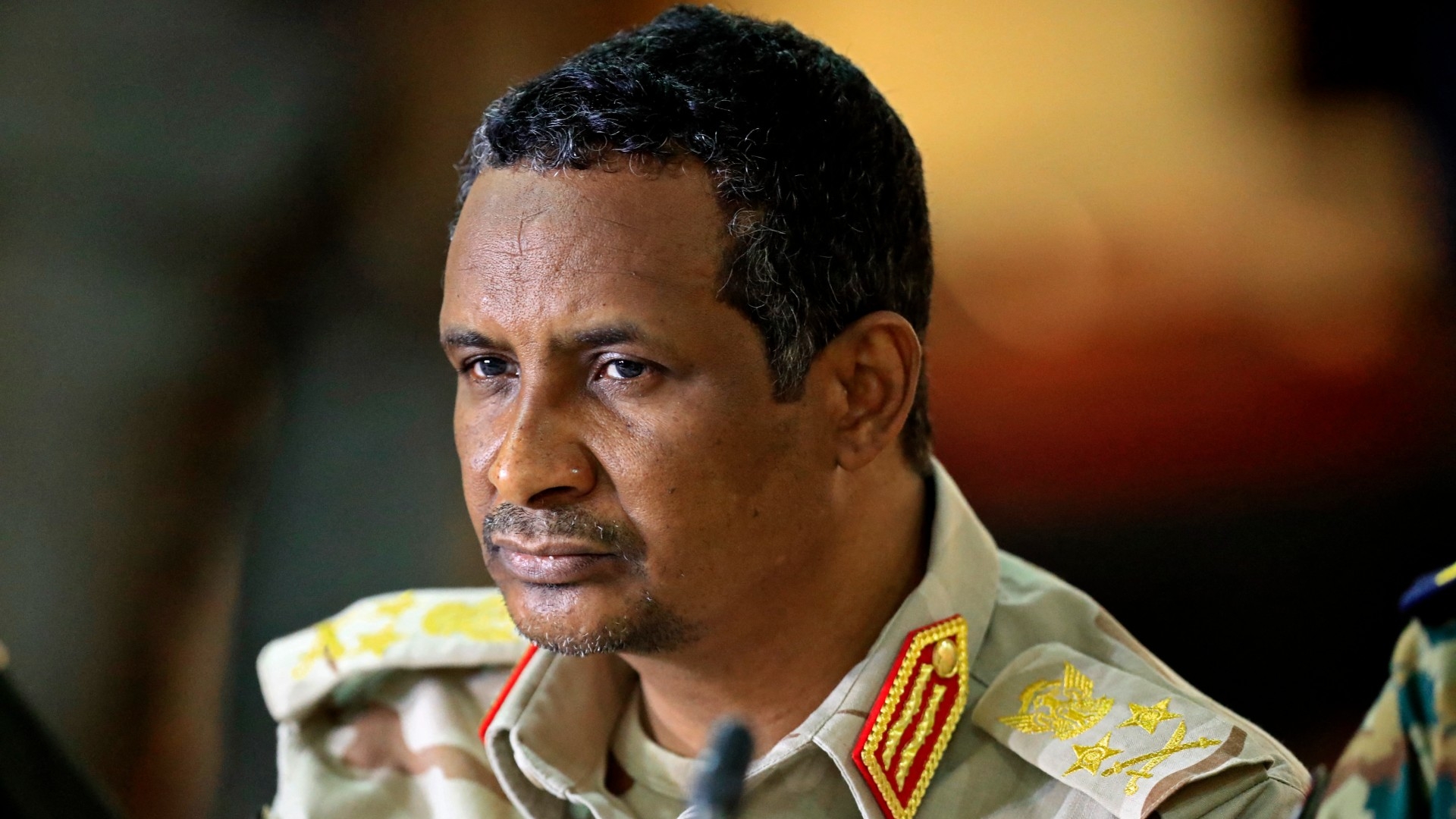
The commander of Sudan's Rapid Support Forces (RSF) accused Egypt on Wednesday of taking part in air strikes against his forces near the capital Khartoum.
In a recorded video, Mohamed Hamdan Dagalo (known as Hemeti) claimed that his forces in the Jebel Moya area southeast of Khartoum were "treacherously attacked and killed by Egyptian aircraft."
"We have remained silent for a long time about Egyptian air involvement in the war, hoping they would withdraw, but now they have escalated," he said in an address to his forces.
Cairo later on Wednesday denied the accusation, with the foreign ministry calling on the international community to verify the evidence of Hemeti's claims.
Hemeti also accused Cairo of training the Sudanese army and supplying it with drones, in the war between the army and the RSF that started in April last year.
New MEE newsletter: Jerusalem Dispatch
Sign up to get the latest insights and analysis on Israel-Palestine, alongside Turkey Unpacked and other MEE newsletters
"Hemeti's statement generally indicates a recent shift in the balance of power, which explains Hemeti's concern that this might be the result of direct foreign intervention in support of the army," said Ammar Fayed, a geopolitical analyst.
Hemeti's paramilitary forces have been at war with the Sudanese Armed Forces (SAF), an ally of Cairo, since April 2023.
The two sides have in recent weeks been engaged in fierce battles over control of the capital Khartoum, with the SAF reporting major advances on RSF-held parts of the city.
There have been numerous reports throughout the conflict, including by Middle East Eye, about Egyptian military support for the SAF.
However, in recent months, it seems that Egypt has scaled back direct intervention, Fayed said, likely due to the uncertainty over whether the conflict would be decisively won by the army.
"Cairo might be unable to decisively intervene to secure a victory for the army, but at the very least, it seems to be enforcing certain red lines to prevent RSF advancements," Fayed told Middle East Eye.
UAE support
Hemeti claimed that alleged bombs dropped by Egyptian planes on Sudan were American-made, and that Iranians are taking part in hostilities alongside the SAF.
"If the Americans were not in agreement these bombs would not reach Sudan," he said.
Hemeti also made references to the alleged presence of Tigrayan, Eritrean, Azerbaijani and Ukrainian mercenaries in the country.
His accusations came a day after the US imposed sanctions on his younger brother, accusing him of leading arms procurement for the paramilitary forces and prolonging the war in Sudan.
The US Treasury said on Tuesday that Hemeti's brother, Algoney Hamdan Daglo Musa, controls a company in Dubai that has acted as a front for the RSF to supply it with arms during the current conflict.
SAF chief General Abdel Fattah al-Burhan, Sudan's de facto head of state, said in an address to the UN General Assembly last month that the RSF was "receiving political and logistical support at the local and regional levels", without naming the United Arab Emirates.
Middle East Eye has reported extensively on how the UAE has become the RSF's main regional patron.
But at a press conference after his speech, Burhan said that UAE ruler Mohammed bin Zayed Al Nahyan had promised "to reconsider the situation" in a phone call the two men had in July.
Meanwhile, Abu Dhabi accused the SAF last month of bombing the residence of its ambassador in Khartoum, but the army has denied the accusations.
RSF forces 'defeated'
In his address, Hemeti accused "between six to seven" unnamed countries of supporting the other side, either directly or indirectly.
Addressing his forces in Jebel Moya, which was recaptured by the army a few days ago, he said: "You were not defeated, and we are proud of you... you are reorganising, and just as we previously took control of Jebel Moya, we will do so again.
"You were defeated due to overwhelming force and modern aircraft like Sukhoi and MiG-29... In the end, sheer numbers defeated bravery."
On Saturday, the SAF announced it had regained control of the Jebel Moya area in Sennar state, after fierce battles that lasted for days.
The RSF had taken control of Jebel Moya in late June, cutting off supply routes to the White Nile, Kordofan and Darfur states. It later managed to control most of Sennar state, including its capital, Singa.
The fighting between the RSF and the Sudanese army has displaced more than 10 million people and caused a spiralling humanitarian crisis.
At least 13 areas of the country are at risk of famine, and more than 25 million people are facing acute hunger, according to the World Food Programme.
Talks mediated by Washington in Geneva in September failed to make progress toward a ceasefire but resulted in both sides pledging to improve humanitarian access.
Hemeti, however, did not signal any progress towards peace. "This war will not end in one or two, three, four years. Some talk about one million soldiers and soon we will reach one million," he said.
Rights groups have accused the RSF of a multitude of atrocities against civilians in Sudan, including unlawful killings, rapes and ethnic cleansing.
In May, Human Rights Watch said the violence in Darfur committed by RSF militias could constitute genocide against the Masalit community.
A UN fact-finding mission in September said both sides of the conflict may be guilty of atrocities.
The RSF has been besieging el-Fasher, the only capital in the five Darfur states not under its control, since May. Over a million civilians are trapped in the city, prompting fears that they are at risk of extermination by RSF troops.
Middle East Eye delivers independent and unrivalled coverage and analysis of the Middle East, North Africa and beyond. To learn more about republishing this content and the associated fees, please fill out this form. More about MEE can be found here.



